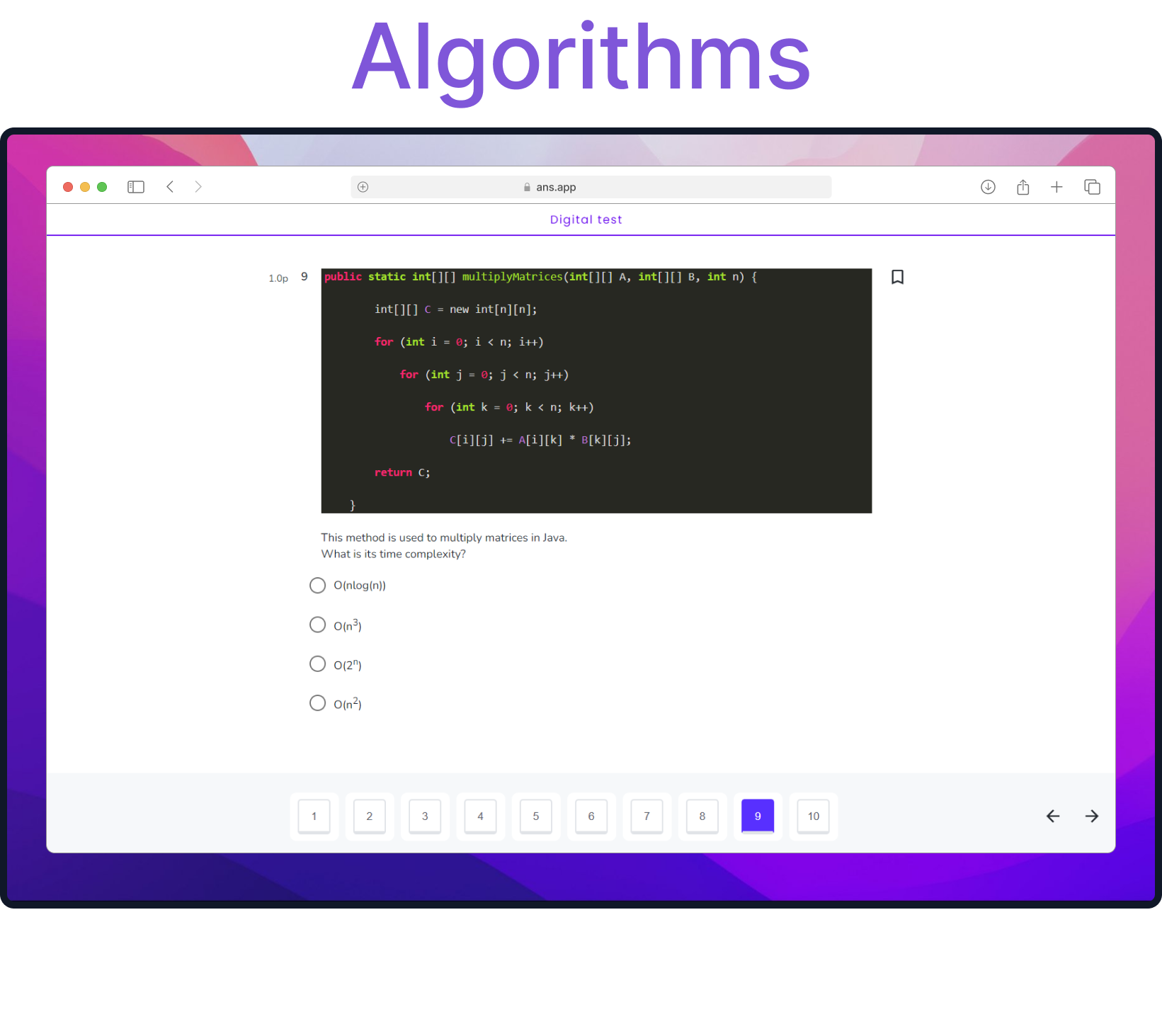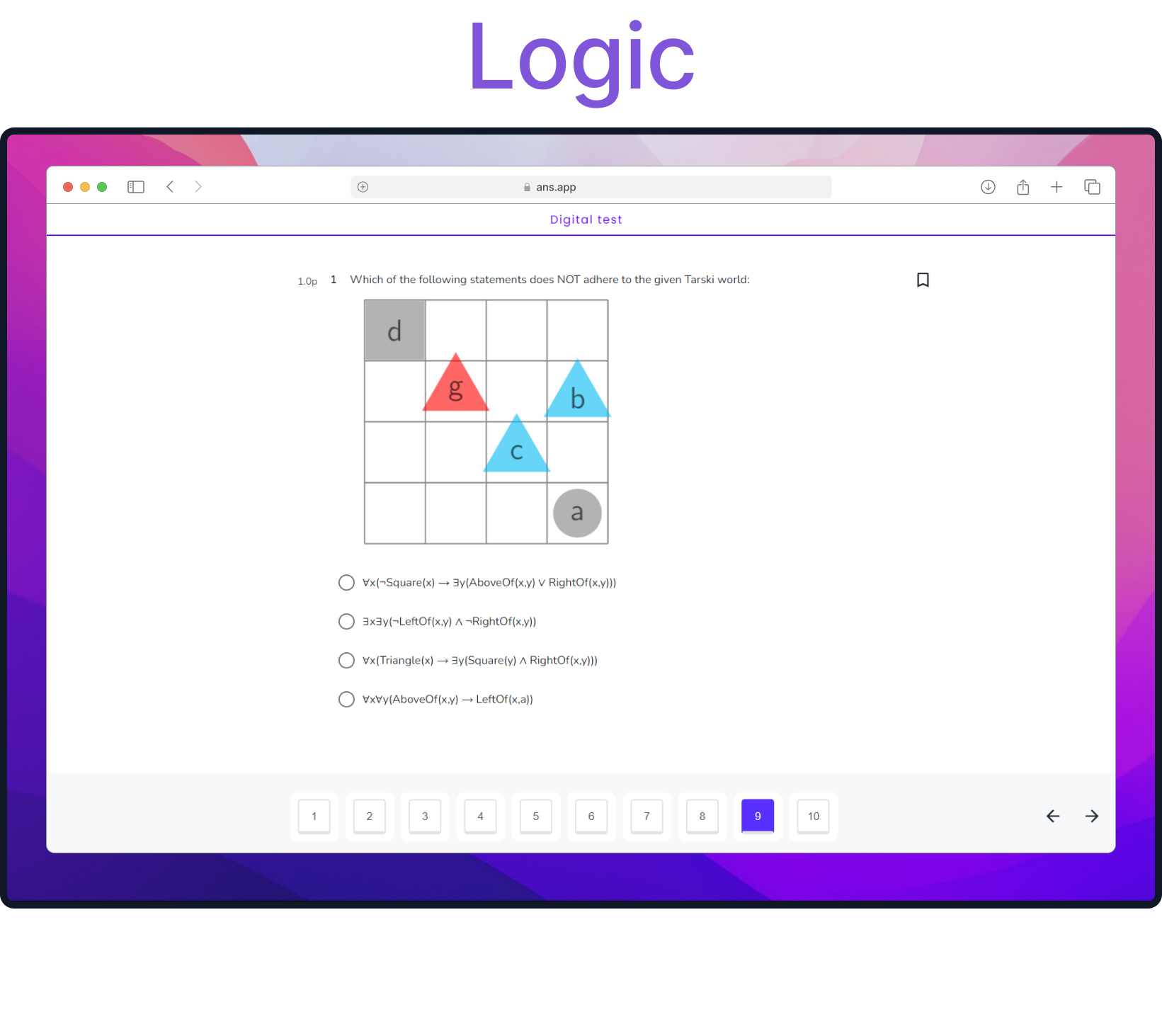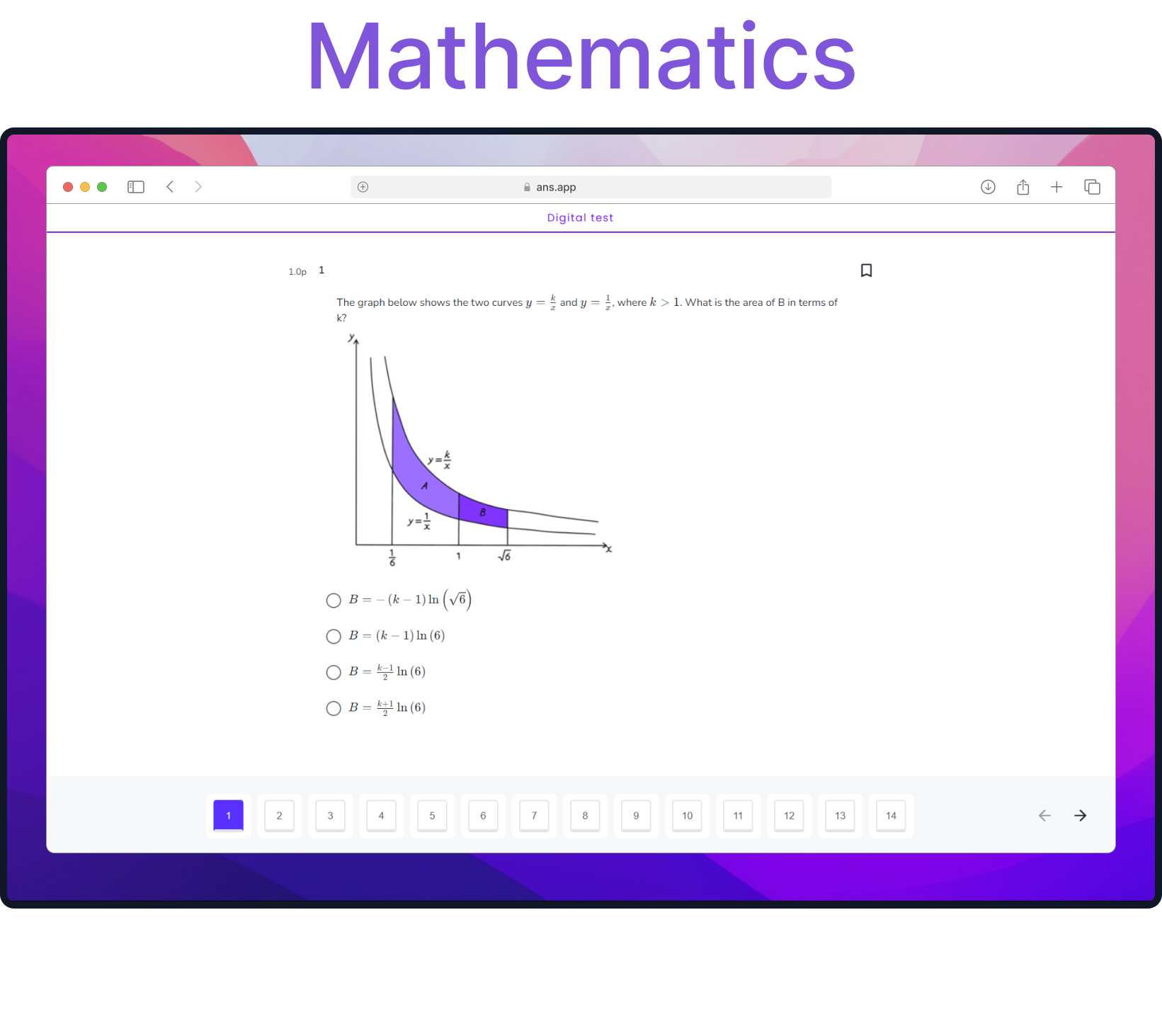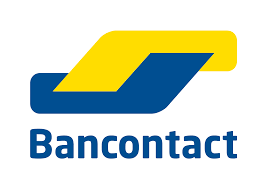All-Subject Prep
More information
Access practice exams for the TU Delft Computer Science and Engineering Cognitive Skills Test, covering Mathematics, Logic, and Algorithms. These exams are based on the most recent test formats and topics, providing realistic practice to help you prepare. With automatic grading and detailed solutions, you can practice as often as needed to build your understanding and confidence.
Practice your Mathematics skills for the TU Delft Computer Science and Engineering Cognitive Skills Test with exams that cover key topics such as functions, calculus, and trigonometry. Each practice exam is automatically graded, and step-by-step solutions are provided to help you understand how to solve each problem.
The math practice exams include questions on the following topics:
- Functions and Graphs: recognition and drawing of polynomial functions, root functions, power functions, logarithmic functions, analyze and draw transformations of these standard functions, determine limits, domain, range, asymptotes and symmetry points, inverse functions
- Algebraic Solving: isolating variables in an expression, rearrange expressions into simplified form, find roots of functions with factorization, solve system of linear equations
- Differential Calculus: derivatives of standard functions, application of product/quotient/chain rule, first and second derivative and analyzing local maximums and minimums and local concave and convex behavior, inflection points, solve optimization problems
- Integral Calculus: limits of integration, definite/indefinite integrals, calculate integral of standard functions, determining surface area, volume of a solid revolution, arc length and mean value of a function
- Trigonometry: functions such as sin(x), cos(x), tan(x), unit circle, exact values of basic trigonometric functions for multiples of angles in the first quadrant, application of the Pythagorean identity, sum and difference identities, double angle formulae
- Geometry: calculate surface and perimeter of two dimensional shapes, calculate volume and surface area of three dimensional objects, determination of lengths and angles with properties of lines, triangles, and quadrilaterals, formulate equations for lines and circles, intersections between lines and circles, distance between points, lines and circles
- Vectors: determine length and direction of vectors, decompose vectors, dot product of two vectors, calculation of angles and distances between vectors, solve problems involving velocity, and acceleration of a point whose path is described by a time-dependent vector representation
Work on your logical reasoning skills with practice exams for the TU Delft Computer Science and Engineering Cognitive Skills Test. The exams cover topics such as propositional logic, Boolean algebra, predicate logic, and deduction techniques. Each exam is automatically graded, and detailed solutions are provided to help you understand each answer.
The Systematic Reasoning & Logical Thinking practice exams contain questions on the following topics:
- Propositional logic: Propositions, Logical operators, Precedence rules, Logical equivalence, Universal operators, classifying propositions.
- Boolean Algebra: The Basics of Boolean Algebra, Substitutions laws, Simplifications and additional laws such as The Law of the Excluded Middle and The Distributive Laws.
- Predicate logic: Predicates, Quantifiers, Operators, Logical Equivalence.
- Deduction: Valid Arguments, Proofs, and Proofs in Predicate Logic.
Develop your computational thinking with practice exams for the TU Delft Computer Science and Engineering Cognitive Skills Test. These exams include questions on algorithmic thinking, design techniques like network flow and dynamic programming, and puzzles. Each practice exam offers automatic grading and detailed solutions to guide your study.
The Algorithmic & Computational Thinking practice exams contain questions on the following topics:
- Algorithmic Thinking: This part will cover topics like, The Big O Notation, Graph Theory, and Data Structures.
- Algorithmic Design: This Part will cover topics like, Network Flow, Divide and Conquer, and Dynamic Programming.
- Puzzles: Two types of puzzles will be tested in this section, Algorithm-Related Puzzles and Non-Algorithm Related Puzzles.
Each practice exam comes with a detailed mark scheme and worked solutions for every question. After completing an exam, you will receive automatic grading to help you understand your performance. The step-by-step solutions show you how to approach each problem and the correct methods to use, making it easier to learn from your mistakes and improve your skills with each attempt.
More information
Access practice exams for the TU Delft Computer Science and Engineering Cognitive Skills Test, covering Mathematics, Logic, and Algorithms. These exams are based on the most recent test formats and topics, providing realistic practice to help you prepare. With automatic grading and detailed solutions, you can practice as often as needed to build your understanding and confidence.
Practice your Mathematics skills for the TU Delft Computer Science and Engineering Cognitive Skills Test with exams that cover key topics such as functions, calculus, and trigonometry. Each practice exam is automatically graded, and step-by-step solutions are provided to help you understand how to solve each problem.
The math practice exams include questions on the following topics:
- Functions and Graphs: recognition and drawing of polynomial functions, root functions, power functions, logarithmic functions, analyze and draw transformations of these standard functions, determine limits, domain, range, asymptotes and symmetry points, inverse functions
- Algebraic Solving: isolating variables in an expression, rearrange expressions into simplified form, find roots of functions with factorization, solve system of linear equations
- Differential Calculus: derivatives of standard functions, application of product/quotient/chain rule, first and second derivative and analyzing local maximums and minimums and local concave and convex behavior, inflection points, solve optimization problems
- Integral Calculus: limits of integration, definite/indefinite integrals, calculate integral of standard functions, determining surface area, volume of a solid revolution, arc length and mean value of a function
- Trigonometry: functions such as sin(x), cos(x), tan(x), unit circle, exact values of basic trigonometric functions for multiples of angles in the first quadrant, application of the Pythagorean identity, sum and difference identities, double angle formulae
- Geometry: calculate surface and perimeter of two dimensional shapes, calculate volume and surface area of three dimensional objects, determination of lengths and angles with properties of lines, triangles, and quadrilaterals, formulate equations for lines and circles, intersections between lines and circles, distance between points, lines and circles
- Vectors: determine length and direction of vectors, decompose vectors, dot product of two vectors, calculation of angles and distances between vectors, solve problems involving velocity, and acceleration of a point whose path is described by a time-dependent vector representation
Work on your logical reasoning skills with practice exams for the TU Delft Computer Science and Engineering Cognitive Skills Test. The exams cover topics such as propositional logic, Boolean algebra, predicate logic, and deduction techniques. Each exam is automatically graded, and detailed solutions are provided to help you understand each answer.
The Systematic Reasoning & Logical Thinking practice exams contain questions on the following topics:
- Propositional logic: Propositions, Logical operators, Precedence rules, Logical equivalence, Universal operators, classifying propositions.
- Boolean Algebra: The Basics of Boolean Algebra, Substitutions laws, Simplifications and additional laws such as The Law of the Excluded Middle and The Distributive Laws.
- Predicate logic: Predicates, Quantifiers, Operators, Logical Equivalence.
- Deduction: Valid Arguments, Proofs, and Proofs in Predicate Logic.
Develop your computational thinking with practice exams for the TU Delft Computer Science and Engineering Cognitive Skills Test. These exams include questions on algorithmic thinking, design techniques like network flow and dynamic programming, and puzzles. Each practice exam offers automatic grading and detailed solutions to guide your study.
The Algorithmic & Computational Thinking practice exams contain questions on the following topics:
- Algorithmic Thinking: This part will cover topics like, The Big O Notation, Graph Theory, and Data Structures.
- Algorithmic Design: This Part will cover topics like, Network Flow, Divide and Conquer, and Dynamic Programming.
- Puzzles: Two types of puzzles will be tested in this section, Algorithm-Related Puzzles and Non-Algorithm Related Puzzles.
Each practice exam comes with a detailed mark scheme and worked solutions for every question. After completing an exam, you will receive automatic grading to help you understand your performance. The step-by-step solutions show you how to approach each problem and the correct methods to use, making it easier to learn from your mistakes and improve your skills with each attempt.
More information
Access practice exams for the TU Delft Computer Science and Engineering Cognitive Skills Test, covering Mathematics, Logic, and Algorithms. These exams are based on the most recent test formats and topics, providing realistic practice to help you prepare. With automatic grading and detailed solutions, you can practice as often as needed to build your understanding and confidence.
Practice your Mathematics skills for the TU Delft Computer Science and Engineering Cognitive Skills Test with exams that cover key topics such as functions, calculus, and trigonometry. Each practice exam is automatically graded, and step-by-step solutions are provided to help you understand how to solve each problem.
The math practice exams include questions on the following topics:
- Functions and Graphs: recognition and drawing of polynomial functions, root functions, power functions, logarithmic functions, analyze and draw transformations of these standard functions, determine limits, domain, range, asymptotes and symmetry points, inverse functions
- Algebraic Solving: isolating variables in an expression, rearrange expressions into simplified form, find roots of functions with factorization, solve system of linear equations
- Differential Calculus: derivatives of standard functions, application of product/quotient/chain rule, first and second derivative and analyzing local maximums and minimums and local concave and convex behavior, inflection points, solve optimization problems
- Integral Calculus: limits of integration, definite/indefinite integrals, calculate integral of standard functions, determining surface area, volume of a solid revolution, arc length and mean value of a function
- Trigonometry: functions such as sin(x), cos(x), tan(x), unit circle, exact values of basic trigonometric functions for multiples of angles in the first quadrant, application of the Pythagorean identity, sum and difference identities, double angle formulae
- Geometry: calculate surface and perimeter of two dimensional shapes, calculate volume and surface area of three dimensional objects, determination of lengths and angles with properties of lines, triangles, and quadrilaterals, formulate equations for lines and circles, intersections between lines and circles, distance between points, lines and circles
- Vectors: determine length and direction of vectors, decompose vectors, dot product of two vectors, calculation of angles and distances between vectors, solve problems involving velocity, and acceleration of a point whose path is described by a time-dependent vector representation
Work on your logical reasoning skills with practice exams for the TU Delft Computer Science and Engineering Cognitive Skills Test. The exams cover topics such as propositional logic, Boolean algebra, predicate logic, and deduction techniques. Each exam is automatically graded, and detailed solutions are provided to help you understand each answer.
The Systematic Reasoning & Logical Thinking practice exams contain questions on the following topics:
- Propositional logic: Propositions, Logical operators, Precedence rules, Logical equivalence, Universal operators, classifying propositions.
- Boolean Algebra: The Basics of Boolean Algebra, Substitutions laws, Simplifications and additional laws such as The Law of the Excluded Middle and The Distributive Laws.
- Predicate logic: Predicates, Quantifiers, Operators, Logical Equivalence.
- Deduction: Valid Arguments, Proofs, and Proofs in Predicate Logic.
Develop your computational thinking with practice exams for the TU Delft Computer Science and Engineering Cognitive Skills Test. These exams include questions on algorithmic thinking, design techniques like network flow and dynamic programming, and puzzles. Each practice exam offers automatic grading and detailed solutions to guide your study.
The Algorithmic & Computational Thinking practice exams contain questions on the following topics:
- Algorithmic Thinking: This part will cover topics like, The Big O Notation, Graph Theory, and Data Structures.
- Algorithmic Design: This Part will cover topics like, Network Flow, Divide and Conquer, and Dynamic Programming.
- Puzzles: Two types of puzzles will be tested in this section, Algorithm-Related Puzzles and Non-Algorithm Related Puzzles.
Each practice exam comes with a detailed mark scheme and worked solutions for every question. After completing an exam, you will receive automatic grading to help you understand your performance. The step-by-step solutions show you how to approach each problem and the correct methods to use, making it easier to learn from your mistakes and improve your skills with each attempt.
Mapping your journey
ANS Account Creation
Start Practicing
Exam Day: TU Delft Cognitive Skills Test (CST)
ANS access expires
Explore more
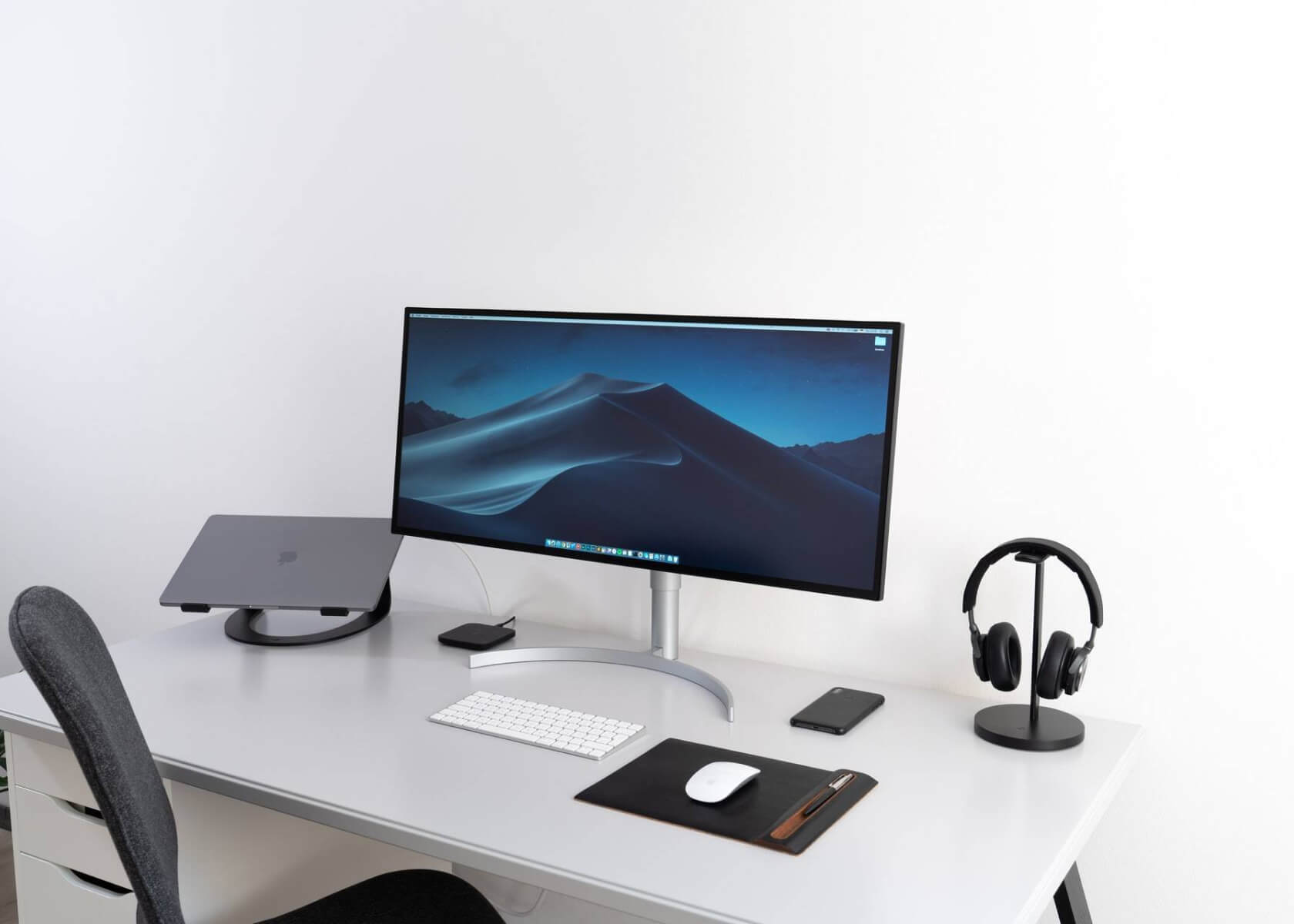
TU Delft Computer Science Application Guide 2025/26

Tips & Tricks for the Computer Science Selection Test

TU Delft Costs: A Student's Guide

Understanding the Ranking System of the Entrance Exams
Frequently asked questions
However, DelftPrep simplifies the process by providing a structured approach, saving you time and effort in figuring out what to study. During a busy period when high school students are also preparing for their final exams, we act as a one-stop shop with a curated set of high-quality, exam-style questions, helping you focus on what matters most.
With our program, our students currently achieve a 62% acceptance rate, which is almost 3x higher than average. We are constantly improving our materials and support to help students maximize their chances. We’re also with them every step of the way; if they have questions, worries, or need advice, they can always reach out to us directly.
- Aerospace structures and materials
- Aerodynamics
- Flight mechanics
- Space.
The material is a mix of sections from a digital textbook and video lectures. TU Delft releases the FYM only a few weeks before the exam on purpose; so they can test how quickly candidates learn new material independently.
It’s generally not necessary to practice FYM exams before TU Delft publishes the new one, since the material often changes. However, some topics do overlap year to year, so if you want a head start and don’t mind practicing with material that might not appear on the exam, you can begin earlier. From our experience, it’s also completely fine to start preparing once the new FYM is released and our exams are updated.
Our platform offers plenty of practice questions, structured to cover key exam topics, along with crash courses that address material not always covered in class and provide valuable exam tips. We also help students practice performing under time constraints, which many find the hardest part, and familiarize them with taking exams online to improve speed and confidence. Additionally, we ensure students are comfortable with the English terminology used in the exam, helping them feel thoroughly prepared while respecting the integrity of the selection process.
We generally recommend starting intensively in January, once TU Delft publishes the new First Year Material and we update all our exams.
However, you can safely start much earlier (e.g. September, October, November) by focusing on the math and physics exams, since those subjects do not change from year to year. The only section that changes annually is the First Year Material (FYM). If you want a head start, practice math and physics early, then add FYM once TU Delft publishes it.
We’ve also noticed that students who spend more time with our practice exams tend to have a higher chance of getting accepted. On average, it takes about 40 hours to work through all of our material, and candidates who complete this tend to perform very well. That’s why it’s important to time your preparation so you can realistically fit in those 40 hours before the exam in March. We know the final year of high school is demanding, so planning ahead makes a big difference.


